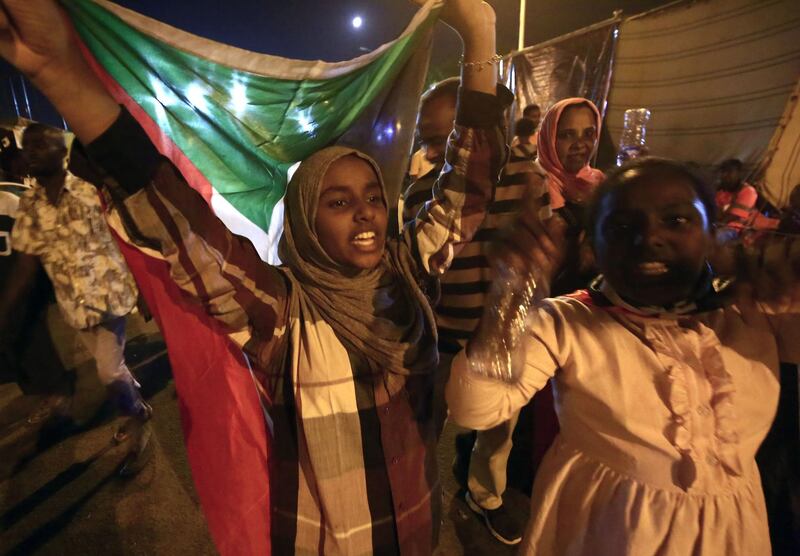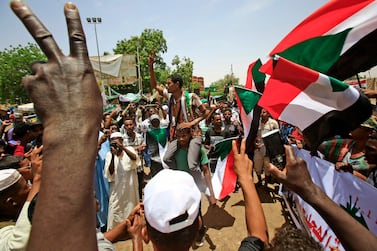Bedevilled by ruinous civil strife and chronic economic woes, Sudan may finally be approaching a respite from a dilapidating run dating back to the independence of the vast Afro-Arab nation in 1956.
A month after the military removed longtime authoritarian ruler Omar Al Bashir following a popular uprising, protest representatives and the ruling generals are making progress towards an agreement on a transitional administration to run the country until elections are held.
In the biggest breakthrough in weeks of negotiations since the April 11 removal of Mr Al Bashir, the two sides agreed early on Wednesday on the makeup of a key part of the transitional period: A 300-member legislative council.
An opposition umbrella group called the Declaration of Freedom and Change Forces will control two thirds of the seats. The remaining seats will be filled by other political parties with the approval of both the umbrella group and the generals.
The negotiating parties also announced a compromise over the length of the transitional period on Wednesday, with both sides agreeing to a three-year interim period. The military had proposed a two-year transition, while the protesters hoped for four.
Significantly, the two sides agreed to devote the first six months of the transitional period to resolving the three conflicts that have over the years created a series of humanitarian crises of gigantic proportions.
The conflicts are in the Nuba Mountains, Darfur west of Khartoum, and in the Blue Nile province to the south of the capital, where rebels fight government forces to press demands for a proportionate share of state resources and an end to their perceived marginalisation by the Arabised north of the country.
As a result of these conflicts, some eight million of the country’s estimated population of over 40 million are displaced, while much of the state’s resources have been devoted to war.
Earlier, protest organisers had argued a longer transition period was needed to give time to draft a new constitution and election law. Dismantling the “deep state” led by Islamists loyal to Mr Al Bashir, and repealing discriminatory laws introduced by his regime would also take time, they argued. Moreover, holding an election soon after the fall of Mr Al Bashir would likely produce a government dominated by Islamists, who over the past three decades have placed their supporters at all levels of state institutions.
Allowing that would be an unwanted repeat of what happened in neighbouring Egypt, where Islamists won a comfortable majority in parliamentary elections after a popular uprising forced autocratic president Hosni Mubarak to step down in 2011. An Islamist, Mohammed Morsi, later won a presidential election in the summer of 2012. The triumph of the Islamists in both votes was attributed as much to the organisational disarray of the liberal and secular forces behind the uprising as the vast influence and expertise available to the Islamists.
Still to be negotiated between Sudan's generals and protest leaders is the thorniest question of all: Who will head the proposed 11-member sovereign council, the body that will collectively function as a head of state with some far reaching powers along with ceremonial duties. The military insists that they need to lead and make up majority of the council. The freedom and change forces insist on a body dominated by their representatives.
Protest leaders argue that they orchestrated four months of anti-Al Bashir demonstrations in which some 100 people died and thousands injured or detained and tortured. It was the military's duty to intervene to protect peaceful protesters and remove a president who elected to use deadly force against them, they argue. They did not go to the trouble of forcing the general-turned-president out of office so that the military replaces him, they say. Backing their position are the tens of thousands of supporters who have staged a sit-in protest outside the armed forces' headquarters since April 6, demanding the generals hand power to a civilian government.
It's difficult to imagine the military surrendering power to civilians in a country where generals ruled for more than 50 of the 63 years since independence. Moreover, the generals can argue with some justification that Sudan's three spells of democratic rule since independence – from 1956 to 58, 1964 to 69 and 1986 to 89 –produced dysfunctional governments that neither ended civil wars nor revived the economy.
However, Mr Al Bashir's 29 years in power, the protest leaders counter, is responsible for one of the darkest chapters of Sudan's modern history, with the government fanning sectarian and religious tensions, setting up paramilitary militias to rival the army and allowing institutional corruption to thrive at a time of acute economic crises.
The two sides were meeting again on Wednesday.
"We are sure of victory and we will not back off until we have it," senior opposition activist Siddiq Youssef said in an interview published on Wednesday.







